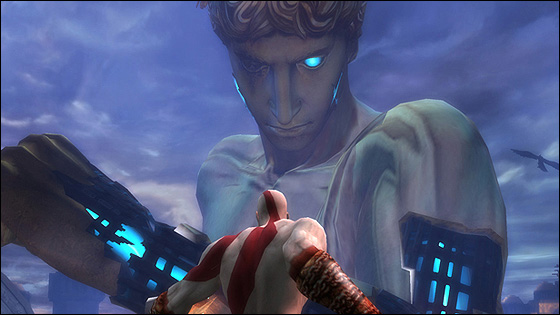God of War II – A Review
August 12th, 2010
Three months ago, and with grand foresight, I vowed to consume as much media (games, movies, comics, books) as I possibly could before I’d leave almost all of it behind as I go to live abroad in China. Some of this media I managed to write about before I left, some of it I’ve subsequently caught up on over the past three months, and then there’s all that note-taking sitting in OpenOffice documents in my writing folder. God of War II belongs to the latter.
God of War II is a direct narrative and gameplay continuation of God of War, which means that, similarly to the Half-life episodes, God of War II streamlines the culmination of mechanics built up by the conclusion of God of War and re-uses them as a base for the beginning of God of War II. By virtue of being welcoming to new players though, Kratos is robbed of these abilities by his father-cum-uber-nemesis Zeus at the game’s onset, acting as a narrative justification to re-teach the ropes and warm players into the experience*.
For continuing players this amounts to a heap redux which God of War II‘s largely peripheral additions to the combat system fail to quell. (Newer players will similarly find the combat stretches beyond its means, but perhaps not as immediately as returning players). A smattering of aggressive new moves mapped to the L1 button when used in conjunction with the face buttons, a spiffied up Rage of the Titans (rage mode) and some new spells do fend off the familiar, but fail to sustain player interest through what is a significantly extended play experience.
That’s not to discount the peripheral additions though, since, as irrelevant as they are to the most established part of the experience (the combat), they do in fact play a part in pushing the game forward. Kratos has a couple of new weapons at his disposal, including a hammer, sword and bow. Aside from the arrow which can be rapidly shot between intermissions of slashing to maintain combos, none of these diversions are given enough spotlight to deliver attention away from the effectiveness of the Blades of Chaos. Smart players will realise that the best way to play God of War II is to ignore these distractions and rely on the tried and trusted attack patterns from God of War while adding a bit of oomph, now and then, with the new L1 attacks or the spells.
It’s a shame that there isn’t enough added variance to the combat as God of War II is an excellent example of good organisation of gameplay elements. God of War II shifts from combat, to puzzling, to platforming, to narrative, to boss battle with an exacting sense of understanding of how much can be bitten off of each of these systems. Furthermore, new mechanics, landscapes and enemy types are interspersed at the most suitable points in the game. You are always presented with something new and interesting just as your enthusiasm for your current occupation begins to wane. Sony Santa Monica clearly nailed this element with a hefty amount player testing, which is why it’s disappointing then that the depleted combat systems works only to subvert the games otherwise great pacing.
It would be remiss of me to forget God of War II‘s stronger emphasis on puzzles, platforming and set pieces, all of which have been well supported by the new time freezing, flying (Icarus’ wings), chain swinging and Medusa’s head mechanics. The set pieces, particularly the flying sequences, are always exciting and well connected to the context of the game (for example, obtaining Icarus’ wings). The boss battles are equally impressive in the way they draw on more elaborate forms of tactics and spatial awareness which isn’t encountered in the moment-to-moment combat.
But ultimately, none of this can save Kratos from that niggling itch that the combat is not fresh and exciting enough to sustain the experience. The end result, which is overbearingly evident by the end of the game, are the large slumps of uninteresting gameplay which undermine the entire production. By failing to directly address the heart of the experience (the combat) in a meaningful way, I don’t think that God of War II is deserving of its title as the “magnum opus” of the PS2. In saying that though, the combat still holds a level of succulence which cannot be denied and despite the lack of revision, God of War II is still a premier action game, particularly in light of the excellent pacing of the experience.
*This last point is surprising given that God of War III simply dumps immediate tutorial on the player.





 Game Design Companion: A Critical Analysis of Wario Land 4 - $7.99
Game Design Companion: A Critical Analysis of Wario Land 4 - $7.99 Level Design: Processes and Experiences
Level Design: Processes and Experiences Speed Boost: The Hidden Secrets Behind Arcade Racing Design - $5.99
Speed Boost: The Hidden Secrets Behind Arcade Racing Design - $5.99 Adventures in Games Analysis: Volume I - $5.99
Adventures in Games Analysis: Volume I - $5.99







